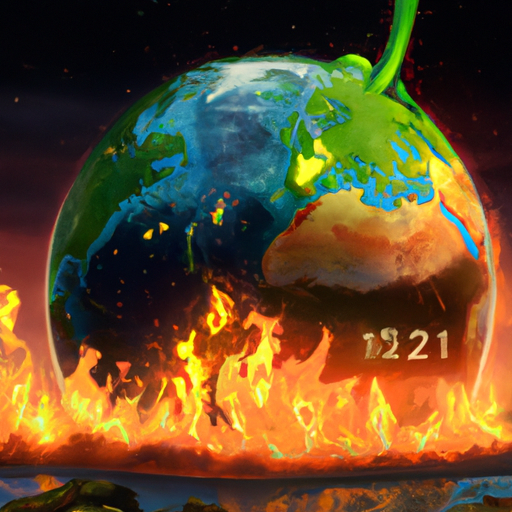
"Caused by" includes both direct and indirect causation.
"Closer" means: on a linear scale, NOT a logarithmic scale.
People are also trading
Half a billion is way more than the estimates I've seen, e.g. fig 3 of https://www.nature.com/articles/s41467-021-24487-w (the blue graph is much closer to expected warming)
One thing that's related to my worldview is that I expect advanced technology to dramatically effect the world and so the effects of climate change far before 2100, like 2050-ish? @evergreenemily
@NoaNabeshima I don't think it's a bad assumption, though it's not one I fully agree with. It really depends on two things, IMO - cheap/accessible fusion energy and carbon capture technology. Fusion is (if we can get it to work) the most efficient way to get energy from matter, it's renewable, and it's zero-carbon, so it could help drastically lower emissions - meanwhile, carbon capture is necessary because CO2 likes to stick around in the atmosphere for a long time once it's up there. However, I don't expect fusion before ~2060 (plus or minus 20ish years) and I worry about how efficient carbon capture technology will actually be - in particular, I feel like the development of the tech is too slow right now. It's a question of "can technology get us out of the mess it got us into," and I think the answer is "maybe, but we need to either work on it really quickly, or rapidly pivot away from fossil fuels even if it causes short-term economic disruption."
A short explanation of my reasoning for betting 1 billion regardless of technical advancements, with full explanations below (this comment got very long, but climatology is a hyperfixation of mine and autism go brrr): we're already seeing permanent or semi-permanent effects of climate change, "indirect causation" opens this market up to a lot of causes of death, and climate change only needs to increase total deaths by 5-10% to reach at least 500 million excess deaths.
The first reason I'm essentially betting on "500 million+ excess deaths from climate change by 2100" is that by the time we've implemented things like carbon capture and fusion, if we don't do anything now, it will have been too late to avoid catastrophic impacts. Even if we get our act together by 2050 and reach negative emissions by then, there's several things that climate change still can and will cause by 2050 that are either difficult or impossible to repair - glaciers take much longer to re-form than they do to melt (and this is even more true for massive ice sheets at the poles), methane released from melted permafrost doesn't return to the soil, ocean acidification doesn't stop overnight, dead coral doesn't come back to life, extinct species (including some crops, potentially) are gone forever, temperatures remain high until CO2 levels are significantly decreased, extreme weather remains more common for the same reason, and so on.
The second reason is that, crucially, this market is about direct and indirect deaths from climate change. So the number of deaths could include deaths from a LOT of causes. For example:
Global heating --> heat stroke (direct)
Global heating --> ecological disturbance --> tropical diseases spreading poleward (indirect), tropical venomous animals spreading poleward (indirect)
Global heating --> ecological disturbance --> crop failure, food chain collapse & mass extinction --> malnutrition and starvation (indirect), wars over arable land and food (indirect), violence caused by chaos and political instability (indirect)
Global heating --> extreme weather --> hurricane/typhoon deaths (indirect), flood deaths (indirect), weakened infrastructure e.g. bridge collapses (indirect)
Global heating --> extreme weather & loss of glaciers/snowpack --> drought --> water shortages (indirect) --> wars over water (indirect), violence caused by chaos and political instability (indirect)
Global heating --> sea level rise --> flood deaths (indirect), coastal infrastructure collapse (indirect)
Global heating --> sea level rise --> mass migration --> deaths during migration, e.g. boats sinking (indirect), anti-immigrant violence (indirect), wars caused by anti-immigrant sentiment (indirect), violence caused by chaos and political instability (indirect)
Global heating --> political inaction --> protests and unrest --> protestors and counter-protestors killed (indirect), bystanders killed (indirect), politicians assassinated (indirect), oil/gas executives assassinated (indirect)
Global heating --> political inaction --> climate anxiety --> stress-induced illness, including heart attacks/heart failure (indirect), suicide (indirect)
If there's an especially bloody, violent war over resources between India, China, and neighboring countries such as Pakistan - and ESPECIALLY if nukes get involved - that alone could cause tens or even hundreds of millions of deaths.
The third reason is that 500 million excess deaths sounds like an absurd number...but if the world experiences 100+ million deaths per year by the 2050s, and higher after that, then climate change only needs to increase the number of total deaths per year by something like 5-10%, depending on the exact number of "normal" deaths.
@evergreenemily
All of this is very fuzzy/uncertain for me, but I want to try to state my fuzzy/uncertain beliefs!
The main advanced technology I anticipated was AI, where my idea was that AI would help by making things generally abundant and accelerate anti-climate-change-badness technologies, beyond what you would expect from current trends.
Also I imagine this isn't compelling to you and I am confused ab how compelling it is for me, but if AI kills everyone in the next 3 decades, then probably 500M people won't die from climate change.
I think that even though it seems small, a 5-10% increase in deaths per year might be really hard to do.
I agree that there are many paths by which climate change can indirectly kill people, but I currently imagine that the sum of those paths aren't that extreme.
I'm going to go through your list now
@evergreenemily global warming -> (heat stroke)
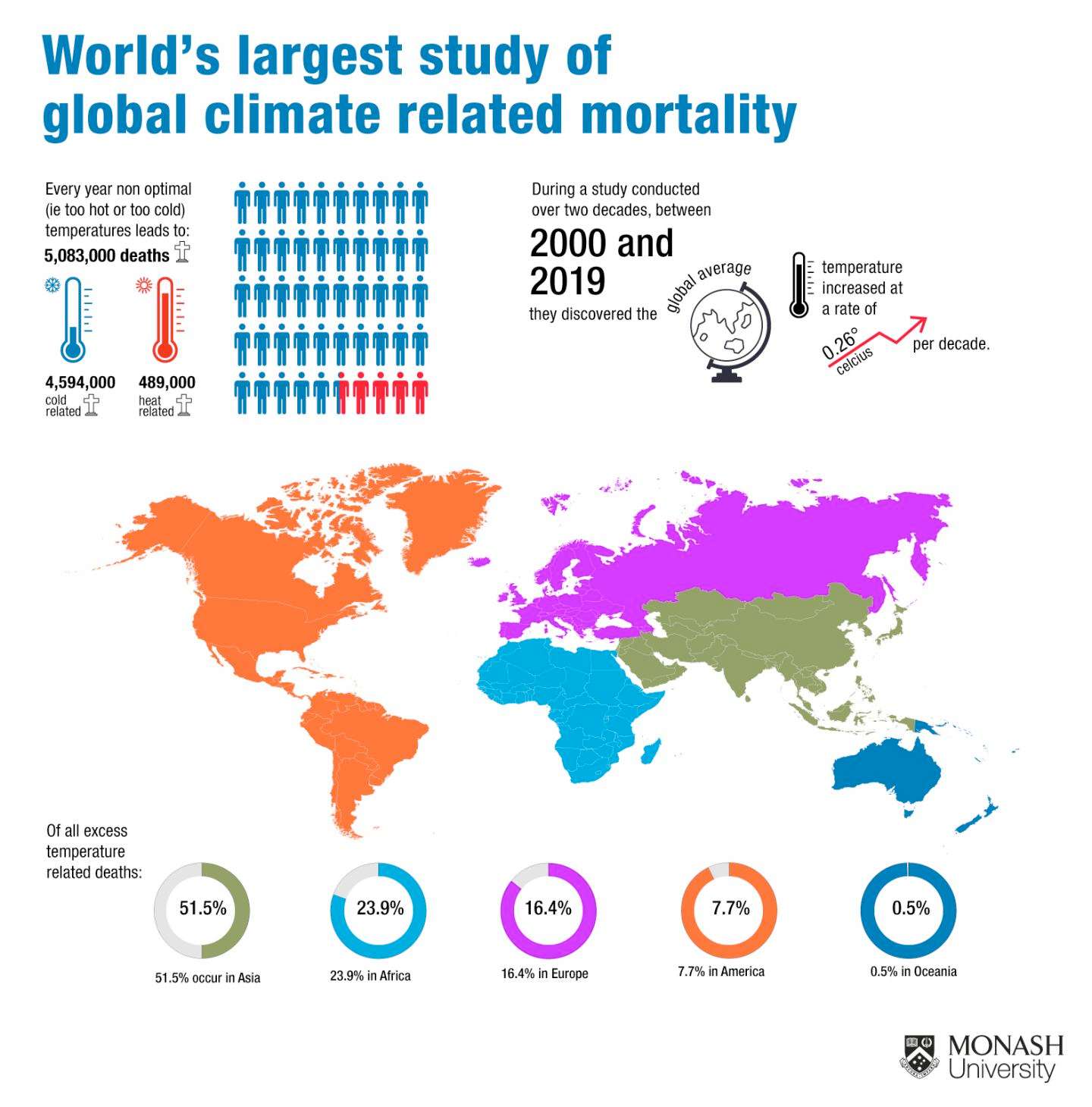
https://www.eurekalert.org/news-releases/580418
500K heat related deaths/year vs 5M cold related deaths/year
This suggests that extreme temperature related deaths are pretty high currently. It's unclear if climate change will increase or decrease cold related deaths. @ErnieBornheimer If heat-related deaths increase and cold-related deaths decrease as a result of climate change, does the decrease in cold deaths count against excess deaths?
@evergreenemily Global heating --> ecological disturbance --> tropical diseases spreading poleward (indirect), tropical venomous animals spreading poleward (indirect)
https://ourworldindata.org/grapher/annual-number-of-deaths-by-cause
https://en.wikipedia.org/wiki/Tropical_disease
Tuberculosis: 1.5M
TB-HIV coinfection: 250K
Malaria: 400K
Schistosomiasis: 4K-200K (???)
Other: 100K?
So let's say 2.5M tropical disease related deaths/year.
@evergreenemily Global heating --> ecological disturbance --> crop failure, food chain collapse & mass extinction --> malnutrition and starvation (indirect), wars over arable land and food (indirect), violence caused by chaos and political instability (indirect)
https://ourworldindata.org/grapher/annual-number-of-deaths-by-cause
Nutritional deficiencies: 670K deaths
https://www.wfp.org/news/world-wealth-9-million-people-die-every-year-hunger-wfp-chief-tells-food-system-summit
https://www.un.org/en/chronicle/article/losing-25000-hunger-every-day
Hunger/year: 9M deaths?
https://ourworldindata.org/war-and-peace
Deaths in state-based conflict (which doesn't include people fighting inside a state): ~130K?
violence caused by chaos and political instability: ?? 30K ?? (a guess)
@evergreenemily Global heating --> extreme weather --> hurricane/typhoon deaths (indirect), flood deaths (indirect), weakened infrastructure e.g. bridge collapses (indirect)
https://ourworldindata.org/natural-disasters
40K? downward trend
@evergreenemily Global heating --> extreme weather & loss of glaciers/snowpack --> drought --> water shortages (indirect) --> wars over water (indirect), violence caused by chaos and political instability (indirect)
Seems like UN websites emphasize contaminated drinking water over water shortages for some reason.
https://www.who.int/news-room/fact-sheets/detail/drinking-water
climate change could affect ability to access drinking water in a way that pushes people to contaminated drinking water.
Drought is included already in natural disasters. I think the fact that the natural disasters number is small (40K?) suggests that this number is small, but I feel pretty uncertain about this.
A lot of articles about how many people will face water shortages in coming years, but I haven't found anyone's guesstimate about how many people will die as a result. Notably I think these water shortage numbers are on the order of 1.8B for even the present year.
@evergreenemily Global heating --> sea level rise --> flood deaths (indirect), coastal infrastructure collapse (indirect)
These are included in natural disasters
@evergreenemily Global heating --> sea level rise --> mass migration --> deaths during migration, e.g. boats sinking (indirect), anti-immigrant violence (indirect), wars caused by anti-immigrant sentiment (indirect), violence caused by chaos and political instability (indirect)
Mass migration will rise. I feel very uncertain about wars caused by a result of mass migration.
https://apnews.com/article/ukraine-sudan-internally-displaced-a14f4967ef1295277f9b41b3b170b39a#:~:text=The%20number%20of%20people%20displaced,a%2020%25%20increase%20since%202021.
Number of people displaced because of "disasters like floods and famine" was 8.7M in 2021.
I think the number of indirect deaths as a result of this are fairly low relative to 8.7M today, it must be less than 200K.
I think that a big uncertainty for me is political destabilization as a result of increased migration. My guess is that the death-effects are low though for some reason.
@evergreenemily Global heating --> political inaction --> protests and unrest --> protestors and counter-protestors killed (indirect), bystanders killed (indirect), politicians assassinated (indirect), oil/gas executives assassinated (indirect)
Pretty small? Like less than 3K/year?
@evergreenemily Global heating --> political inaction --> climate anxiety --> stress-induced illness, including heart attacks/heart failure (indirect), suicide (indirect)
Really hard to measure. No idea, but imagine it can't be significant relative to the largest numbers included.
@evergreenemily So then in total
.5M heat related deaths
5M cold related deaths
2.5M tropical disease deaths
.7M nutritional deficiency deaths
9M hunger deaths
.13M state-based conflict deaths
.03M non-state-based conflict deaths
.03M?? non-drought access to water deaths
.1M?? (probably too high?) indirect natural disaster displacement deaths
.003M protest/unrest deaths
??? stress-based deaths (idk how to measure this)
Not counting excess-cold related deaths, that's 13M deaths/year in climate-change affected areas (only of those you mentioned) relative to ~60M deaths/year overall (noting that covid-deaths are an outlier).
Most of that is in the 9M deaths from hunger/starvation and 2.5M deaths from tropical diseases.
@NoaNabeshima I expect deaths is going to be ~1.5X bigger on average over the period from 2023 to 2100 without thinking about climate change so there's a default factor of 1.5X to apply
looking at this
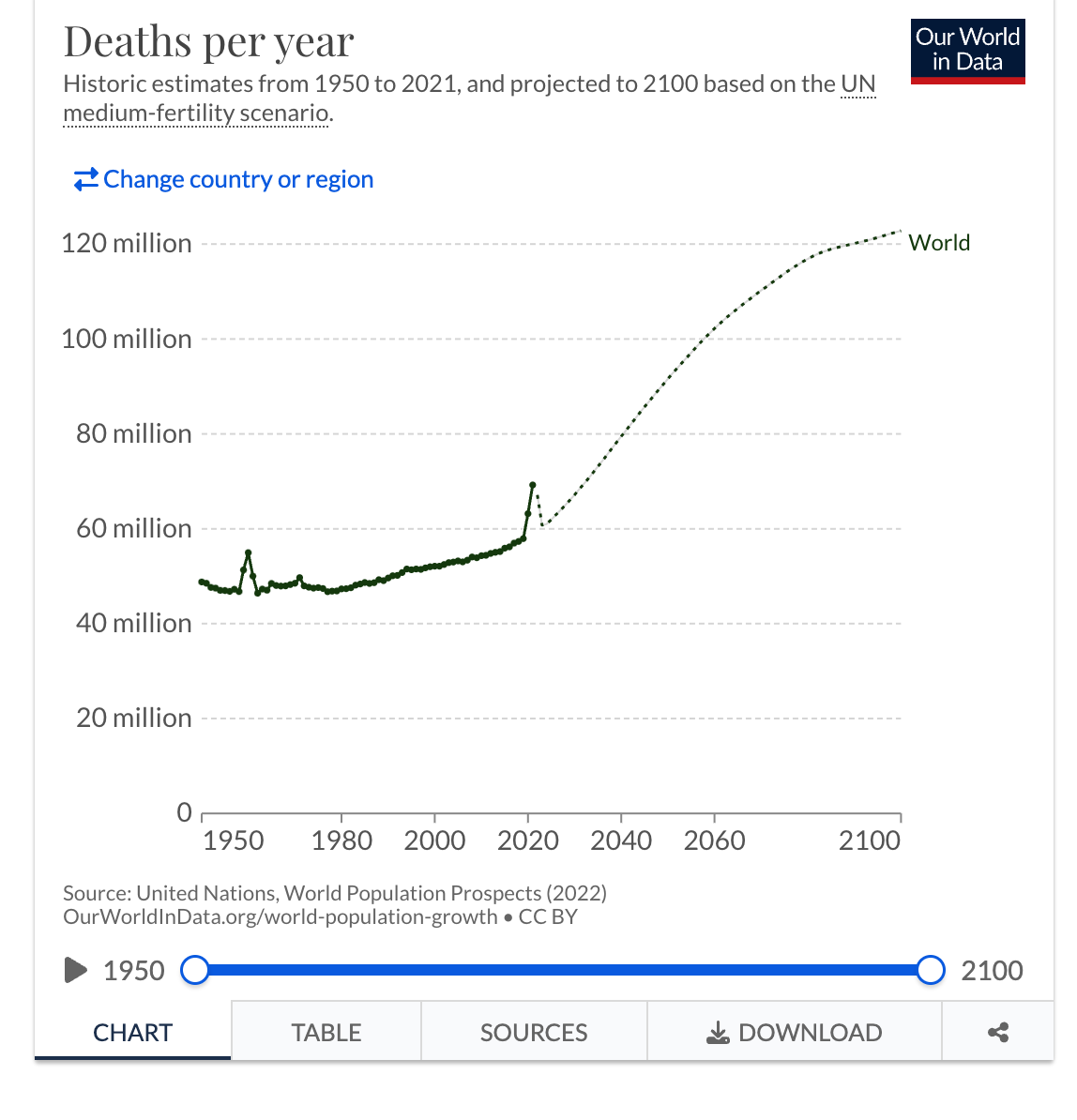
@NoaNabeshima Tropical disease deaths will probably decrease w/o climate change? I do notice that upward tick in malaria deaths
https://ourworldindata.org/malaria
https://www.unaids.org/en/resources/presscentre/featurestories/2020/march/20200323_tb

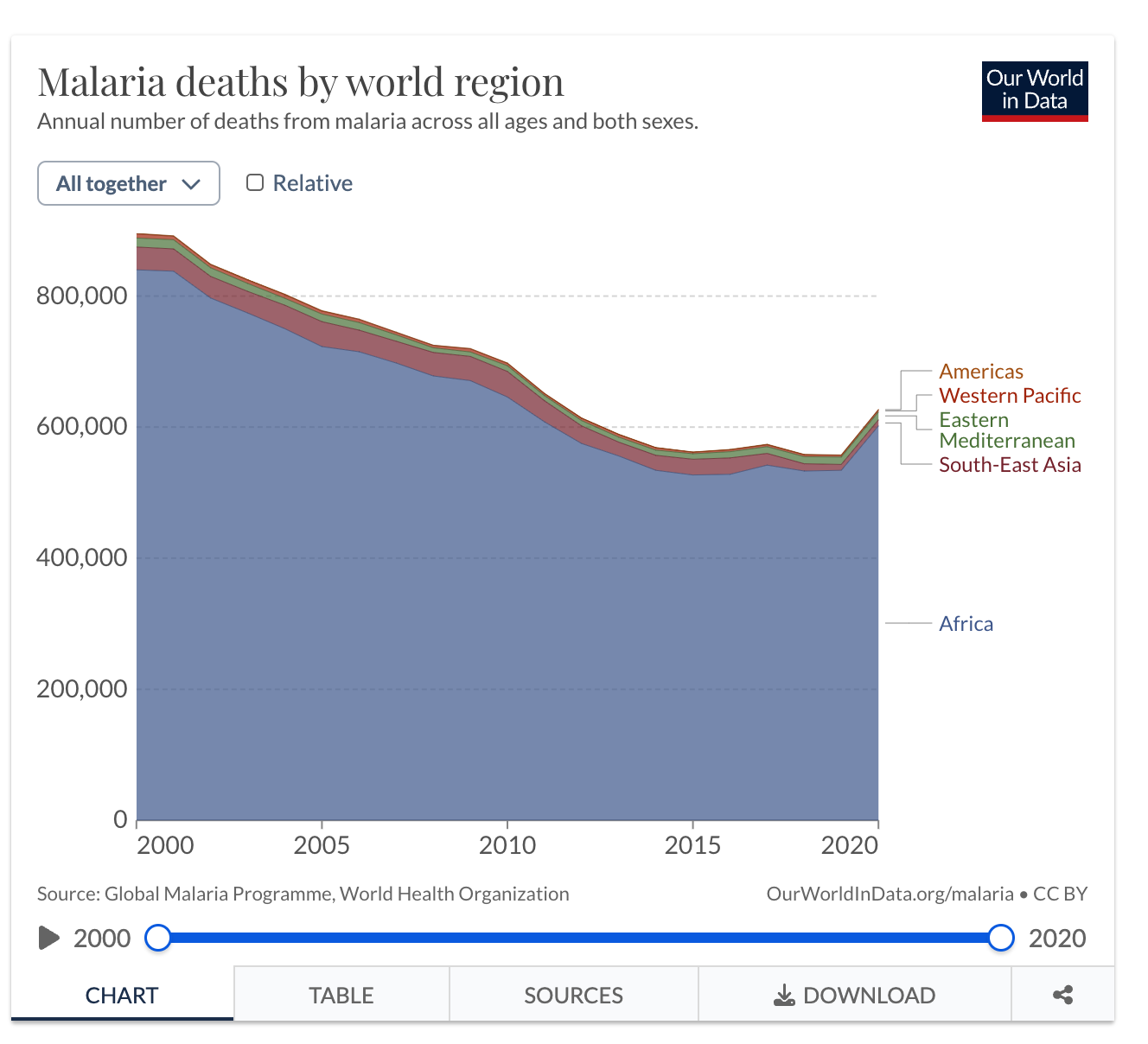
@NoaNabeshima I think hunger related deaths will decrease by default w/o climate change.
https://ourworldindata.org/famines
famine-related deaths have been decreasing, but it's unclear how that relates to hunger as (0.5/100K)*7.9B is only 40K famine deaths per year, far from the 9M hunger-related deaths from the UN
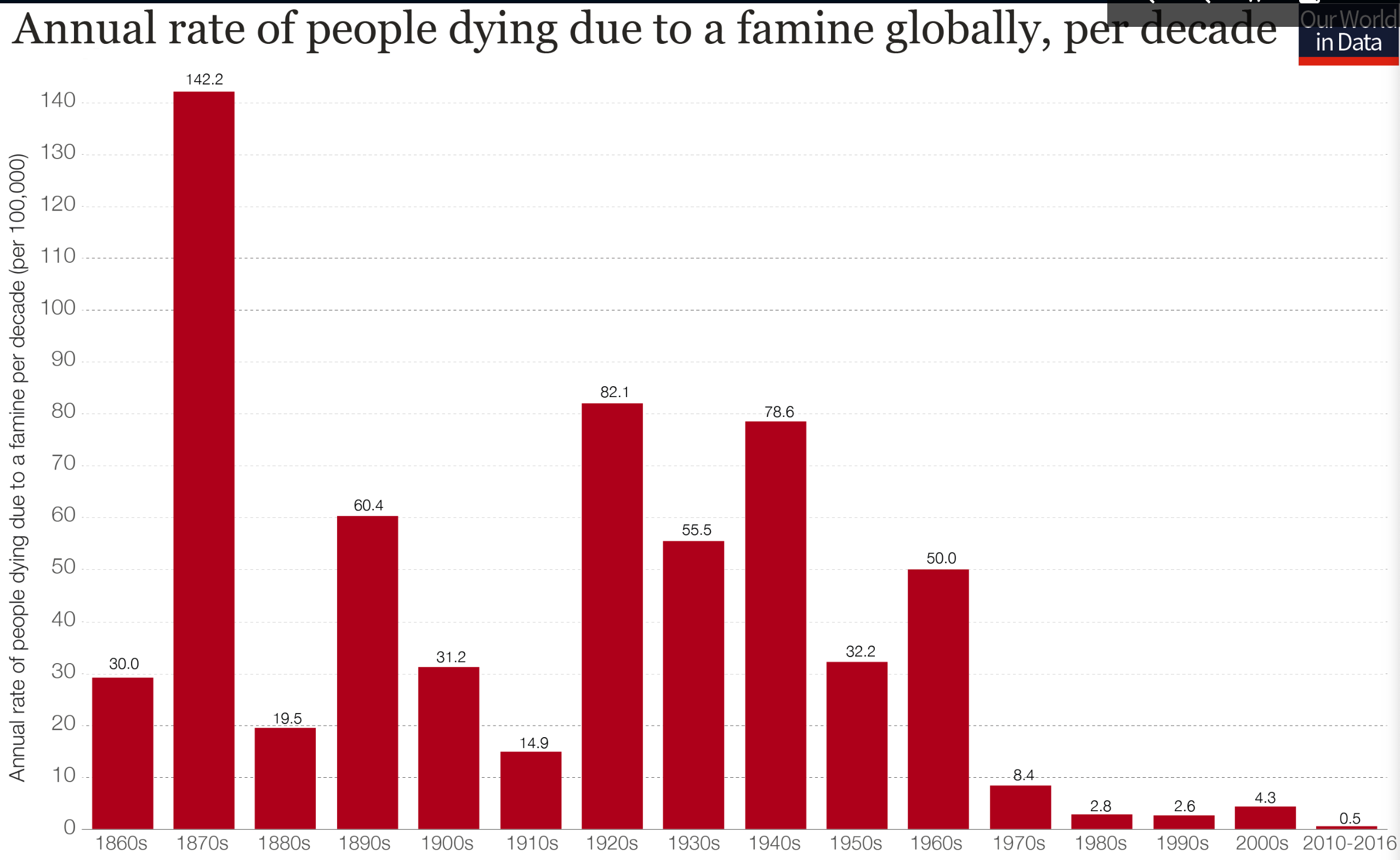
@NoaNabeshima https://news.un.org/en/story/2022/07/1122032
Number of undernourished/prevalence of undernourishment increasing recently, but covid also happened. The uptick in undernourishment began pre-covid.
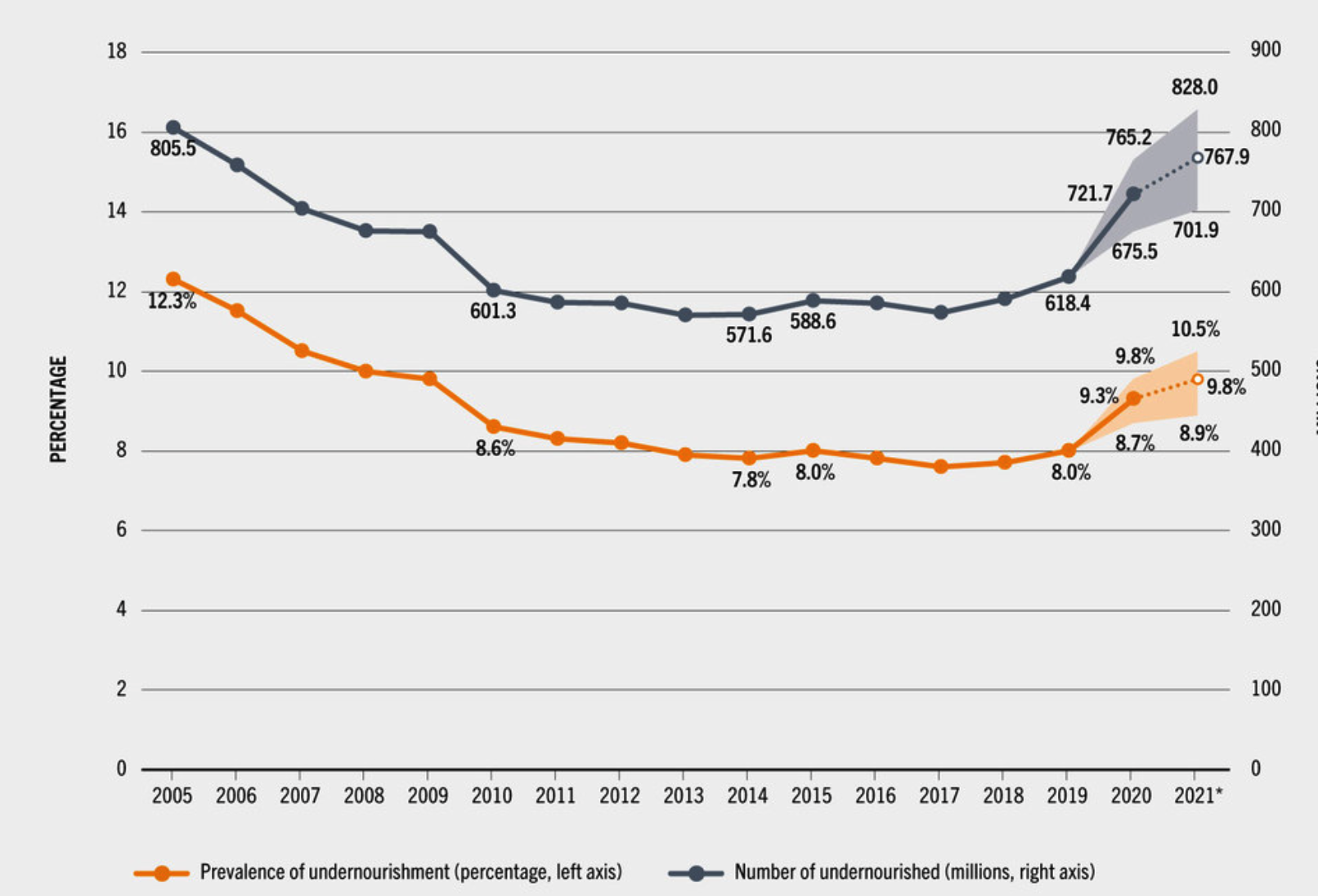
@evergreenemily Yeah so my current sense of what I believe are:
Number of deaths overall will increase w/o climate change because the total number of elderly will increase and the total number of children will increase.
Heat related deaths per capita will increase and cold related deaths per capita will decrease, but the cold-related death decrease will be greater than the heat-related death increase cause there are 10X more cold-related deaths?? (maybe climate change will just make temperature more volatile and increase both, correct me pls)
Tropical disease related deaths will decrease per capita wo climate change, and climate change will increase them relative to counterfactual world probably? Unclear how big this is.
2.5M deaths per year. Idk, like 15%? 375K?
Deaths from hunger will decrease without climate change and increase with climate change? If it's 50% that's 4.5M extra deaths, but that seems too high to me.
So then 4.5M + .4M = ~5M deaths per year. And we need to multiply by 1.5X because of the increasing population, so 7.5M. (77 years to 2100)*(7.5M deaths per year) = 577.5M deaths from climate change (!)
Like a current guess is that hunger-related deaths per capita just go down over time a lot as poverty decreases (without considering climate change), and that the effect of climate change will increase the amt of hunger vs the counterfactual world but it's multiplicative, not additive, so the effect of climate change on hunger will get smaller with time.
https://ourworldindata.org/extreme-poverty-in-brief
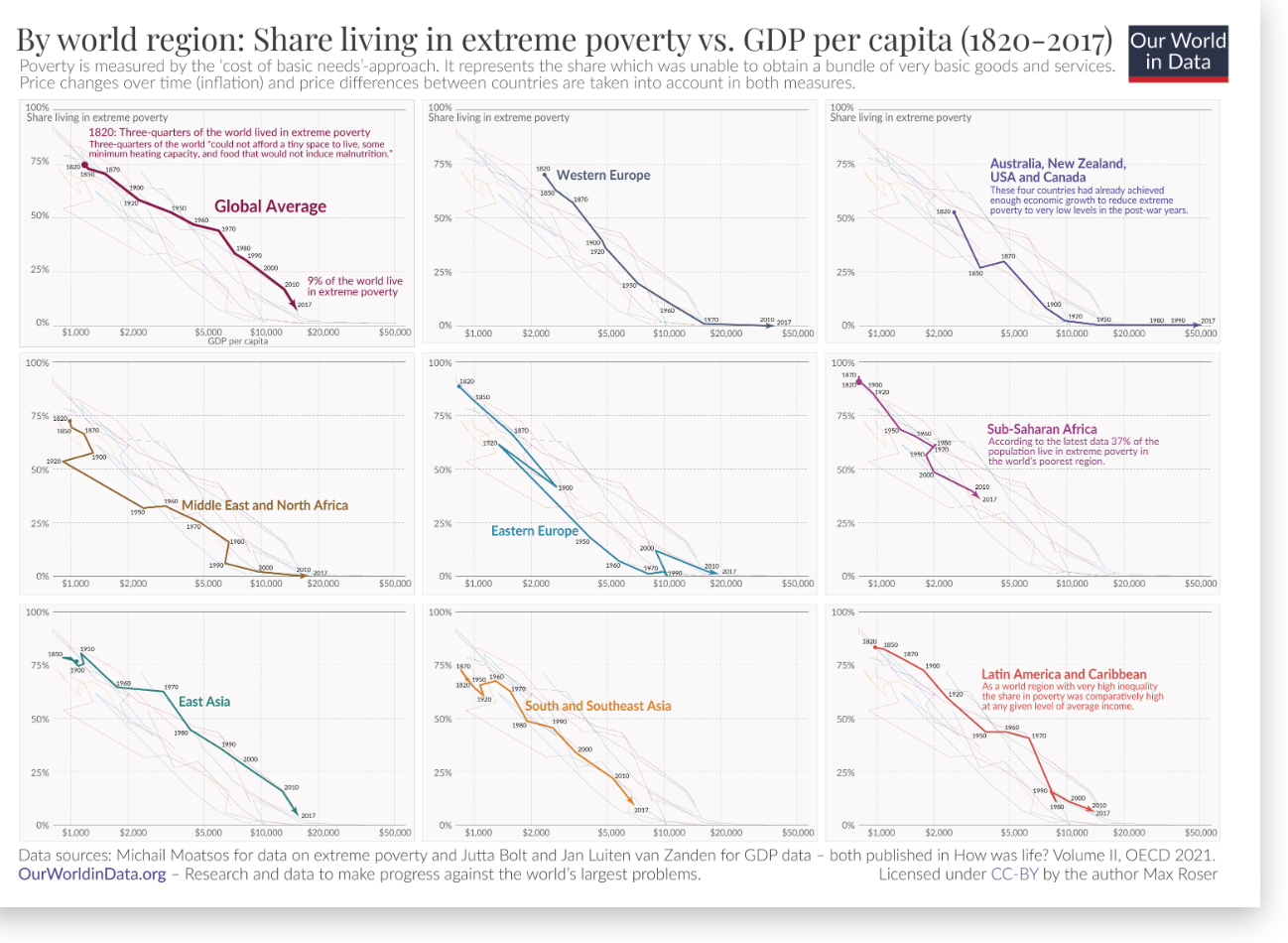
https://www.humanprogress.org/how-we-are-beating-hunger-in-5-graphs/

https://www.weforum.org/agenda/2020/07/global-hunger-rising-food-agriculture-organization-report/

@evergreenemily I'd be down to work w you on a Guesstimate
https://www.getguesstimate.com/
or a squiggle program
https://www.squiggle-language.com/
if you want
@evergreenemily
Metaculus doesn't think natural disasters will increase by lots (but that it will increase)
Thinks tuberculosis deaths will decrease (only 20 predictions)
Global annual death rate from infectious diseases will decrease (probably affected by metaculus users believing powerful AI will come soon fwiw)
Global conflict death rate will decrease
13% prob of nuclear war by 2070
@NoaNabeshima I'd probably change my mind if I thought the hunger deaths would increase substantially @evergreenemily
@NoaNabeshima which unfortunately includes some personal prob of ai/general wealth deus ex machina by 2070
@NoaNabeshima Don't worry, it's at least a bit fuzzy/uncertain for me as well. I haven't been approaching it with the same rigor I'd approach a research project with - especially since chances are this market never resolves (So far, it's impossible to calculate a base rate for websites being open for ~80 years, but it's probably pretty low.)
I think our expectations on AI differ here - I expect a superintelligence around 2040 (maybe a bit earlier or much later), but it's not clear to me if such a superintelligence could actually get all of the governments of the world on its side to combat climate change, especially if a significant portion of voters in the U.S. remain climate deniers. IMO, it really depends on exactly how much smarter than a typical human this superintelligence is, and if there's a rapid intelligence explosion or not.
I don't know exactly what % chance I'd put on "AI kills everyone by 2050," but it's probably on the lower end of the 5-10% range. I do agree that if AI does kill everyone in the next thirty years, there won't be >500 million deaths from climate change (though this market also presumably won't resolve, thanks to ~8-9 billion deaths from rogue AI.)
One thing about climate change that makes projections difficult is that no one is really sure how quickly it will happen. There's all sorts of thresholds that might trigger feedback loops - it's possible the situation could go from "manageable" in 2030 to "disastrous" in 2040 to "oh god, the world is Mad Max now" in 2050, or that it could remain more or less "manageable" the entire time. What researchers do know - or at least suspect - is that the curve of warming is likely to be exponential, rather than linear, which makes projections past 2050 or so fairly difficult.
Temperature-related deaths: Climate change increases average temperatures, but it also increases volatility and makes extreme outcomes more likely. There will be more heat waves and cold snaps, though the increase in heat waves will be more pronounced. Heat waves will also be worse - especially in areas that are hot and humid, like tropical rainforests. Temperatures there could, on rare occasions, reach highs that are dangerous or even highly lethal to anyone not in an air conditioned building. The intensity of the average cold snap probably won't change much, and heat waves outside of the tropics probably remain relatively not-deadly.
Water shortages: Contamination of drinking water is a major concern as well, partially because of more flooding. My original list wasn't exhaustive - I was trying to give a general idea of how broad "indirect causation" can be for something that affects the entire planet on a fundamental level.
Mass migration: The death effects are probably low, but law of large numbers comes into play here. Sea level rise alone could displace about 20 million people in southern Bangladesh alone by 2050, and most of the world's population lives close enough to the coast for increased rates of flooding to be a major concern.
Political inaction/climate anxiety: Mostly included as an example of another way in which indirect causation is extremely broad. I agree that deaths as a result are likely to be fairly low, and probably hard to measure (especially where stress etc. is concerned.) FWIW, I've seen estimates that suggest ~15,000-20,000 climate-change-related suicides are possible in the U.S. by 2050, but as disturbingly large as that number is, it's still a drop in the bucket compared to 500,000,000.
Estimates: One major difference here is that I expect the yearly deaths to be higher, especially post-2050; as climate change itself is not linear, I expect that deaths as a result won't be either. Other than that, I think your methodology is fairly solid (also, Metaculus my beloved.) I'd be down to work on a Guesstimate at some point (when I'm not tired and when it's not 12:30 AM), but if I were to throw together a very loose estimate of my own (all represented as per year):
Extra heat deaths: 100,000 (2020s) --> 200,000 (2030s) --> 300,000 (2040s) --> 500,000 (2050s) --> 750,000 (2050s) --> 1,000,000 --> (2060s) --> 1,500,000 (2070s) --> 2,000,000 (2080s) --> 2,500,000 (2090s); total = 88,500,000
- Extra cold deaths: ~0 (2020s) --> 25,000 (2030s) --> 50,000 (2040s) --> 75,000 (2050s) --> 100,000 (2060s) --> 75,000 (2070s) --> 75,000 (2080s) --> 50,000 (2090s); total = 4,500,000Extra tropical disease deaths: 200,000 (2020s) --> 250,000 (2030s) --> 500,000 (2040s) --> 750,000 (2050s) --> 1,000,000 (2060s) --> 1,000,000 (2070s) --> 1,250,000 (2080s) --> 1,250,000 (2090s); total = 62,000,000
Extra crop failure/starvation deaths (no ecological collapse): 100,000 (2020s) --> 250,000 (2030s) --> 500,000 (2040s) --> 1,000,000 (2050s) --> 2,000,000 (2060s) --> 2,500,000 (2070s) --> 2,750,000 (2080s) --> 2,750,000 (2090s); total = 118,500,000 / probably billions if there is complete ecological collapse
Resource war deaths (no nuclear exchange): ~0 (2020s) --> 10,000 (2030s) --> 30,000 (2040s) --> 75,000 (2050s) --> 125,000 (2060s) --> 125,000 (2070s) --> 100,000 (2080s) --> 100,000 (2090s); total = 5,650,000 / probably 100,000,000 or more if nuclear weapons are used
Extra political instability/violence deaths: ~0 (2020s) --> 2,500 (2030s) --> 7,500 (2040s) --> 15,000 (2050s) --> 20,000 (2060s) --> 20,000 (2070s) --> 22,500 (2080s) --> 22,500 (2090s); total = 875,000
Extra natural disaster deaths: 5,000 (2020s) --> 15,000 (2030s) --> 30,000 (2040s) --> 45,000 (2050s) --> 60,000 (2060s) --> 75,000 (2070s) --> 80,000 (2080s) --> 85,000 (2090s); total = 3,100,000
Extra migrant deaths: 500 (2020s) --> 1,000 (2030s) --> 2,000 (2040s) --> 5,000 (2050s) --> 10,000 (2060s) --> 10,000 (2070s) --> 7,500 (2080s) --> 7,500 (2090s); total = 435,000
Extra heart disease/stress/suicide/etc. deaths: 10,000 (2020s) --> 15,000 (2030s) --> 25,000 (2040s) --> 30,000 (2050s) --> 30,000 (2060s) --> 25,000 (2070s) --> 25,000 (2080s) --> 25,000 (1090s); total = 1,850,000
Which gives an overall total of anywhere from about 300,000,000 to several billion; I think the chance of total ecological collapse is ~16.67% and the chance of a nuclear resource war is ~33.33%, so that's 300,000,000 plus 16.67%(2,500,000,000) plus 33.33%(200,000,000), which is around 750,000,000 taking unlikely catastrophic/borderline-X-risk scenarios into account. Without the risk of complete ecosystem collapse or nuclear war, I do think 500 million would be high - though 300,000,000 extra deaths is still an entire Indonesia or U.S. worth of people.
Decent probability my math is wrong or this is full of typos since it's 1:30 AM, but hopefully it's legible and doesn't read like insane ramblings! I'm gonna get some sleep now.